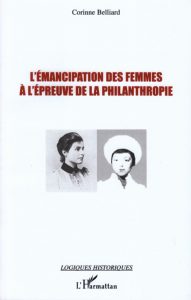
We are pleased to share the most recent book review published by our partner The Philanthropist, written by Julie Raby, Masters candidate in Sociology at Université du Québec à Montréal and PhiLab student.

Corinne Belliard is a historian and professor at Paris’s École des hautes études en sciences sociales. In 2004, she defended her thesis on the women’s liberation movement within the emerging feminist movement of the 19th century. In it, she covers the evolution of women’s roles within two significant philanthropic organizations in the United Kingdom and France, from 1874 to 1914, of which this text is meant to be a synopsis for the general public.
General presentation
Here I provide an overview of the publication’s structure and the author’s main ideas, in the hopes of inspiring you to delve into its pages yourself.
The first section, “Who are the poor?,” exposes the economic and social circumstances of the dynamics between the rich and the poor in the two countries. Belliard explores the dominant schools of thought present at the start of two philanthropic organizations: the Charity Organisation Society (COS), founded in 1870 and the Office Central des Oeuvres de Bienfaisance (OCOB), founded in 1890.
The second, more substantial, section compares the dominant discourses around women and their influence on the gains achieved within these organizations. Belliard’s approach is atypical, analyzing philanthropic archives and studying the intersection of social class and gender. The archives present the poor as a distinct social class in and of themselves, while dividing women, as a group, between both economic classes indistinguishably. Faced with this observation, she tries to understand if rich women considered belonging to the wealthy class as an opportunity for liberation – or if they were nevertheless doomed to be limited to philanthropic and domestic functions and roles as defined by men.
Translation by Katherine Mac Donald
Read the full book review on The Philanthropist’s website here

